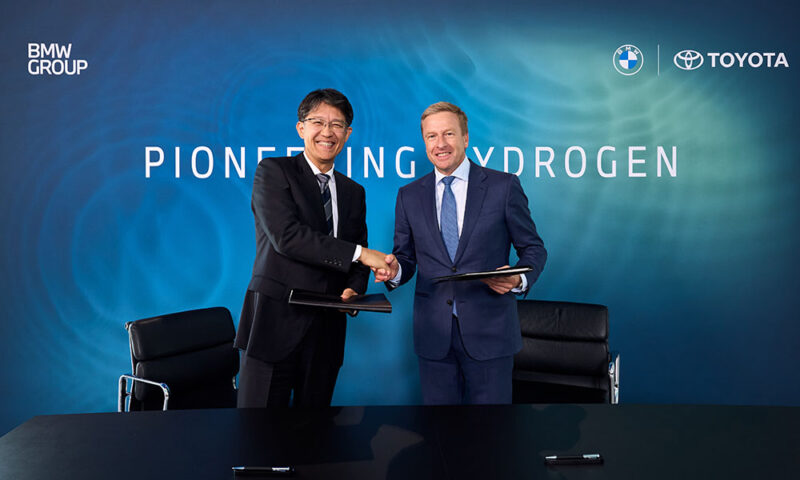
Both companies are promoting hydrogen infrastructure development
BMW plans to launch its first-ever series production fuel cell electric vehicle (FCEV) in 2028, thereby offering customers an additional all-electric powertrain option with zero local emissions in a BMW, the two auto giants announced in a joint press communication.
The BMW Group and the Toyota Motor Corporation are pooling their innovative strength and their technological capabilities to bring a new generation of fuel cell powertrain technology to the roads. Both companies share the aspiration of advancing the hydrogen economy and have extended their collaboration to push this locally zero-emission technology to the next level.
“This is a milestone in automotive history: the first-ever series production fuel cell vehicle to be offered by a global premium manufacturer. Powered by hydrogen and driven by the spirit of our cooperation, it will underscore how technological progress is shaping future mobility,” stated Oliver Zipse, Chairman of the Board of Management, BMW AG.
Collaboration
Koji Sato, President and Member of the Board of Management (Representative Director) Toyota Motor Corporation, affirmed, “We are pleased that the collaboration between BMW and Toyota has entered a new stage. We will accelerate our efforts together with BMW and partners across various industries to realize a future where hydrogen energy supports society.”
Shared powertrain technology utilized across individual models to offer attractive FCEV options. The BMW Group and the Toyota Motor Corporation will jointly develop the powertrain system for passenger vehicles, with the core fuel cell technology (the individual third-generation fuel cells) creating synergies for both commercial and passenger vehicle applications.
The result of this collaborative effort will be utilized in individual models from both BMW and Toyota and will expand the range of FCEV options available to customers, bringing the vision of hydrogen mobility one step closer to reality.
After successfully testing the BMW iX5 Hydrogen pilot fleet worldwide, the BMW Group is now preparing for series production of vehicles with hydrogen drive systems in 2028 on the basis of the jointly developed next-generation powertrain technology.
A new partnership.
The BMW Group and the Toyota Motor Corporation can look back on over a decade of trusting and successful collaboration. Building on this, the companies are now extending their cooperation to accelerate innovation of next-generation fuel cell powertrain systems and pioneer this new technology.
The pathway to realizing the full potential of hydrogen mobility includes its use in commercial vehicles and the establishment of a refuelling infrastructure for all mobility applications, including hydrogen-powered passenger vehicles.
The BMW Group and Toyota Motor Corporation are advocating the creation of a conducive framework by governments and investors to facilitate the early-stage penetration of hydrogen mobility and ensure its economic viability.
Benefits
Hydrogen is recognized as a promising future energy carrier for global decarbonization. It acts as an effective storage medium for renewable energy sources, helping to balance supply and demand and enabling a more stable and reliable integration of renewables into the energy grid.
Hydrogen is the missing piece for completing the electric mobility puzzle where battery electric drive systems are not an optimal solution.
